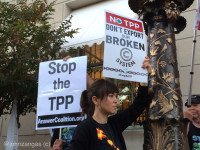As the TPP negotiations reached their conclusion in Atlanta last October, one outstanding issue stood above all others: protection for biologics. While not well understood by the public, at issue was billions of dollars and access to cutting edge medicines. The Trouble with the TPP series examines the outcome of the biologics issue and argues that even with less protection than the U.S. advocated, the TPP’s requirements still represent a significant problem for global health (prior posts include Day 1: US Blocks Balancing Provisions, Day 2: Locking in Digital Locks, Day 3: Copyright Term Extension, Day 4: Copyright Notice and Takedown Rules, Day 5: Rights Holders “Shall” vs. Users “May”, Day 6: Price of Entry, Day 7: Patent Term Extensions).
Biological drugs are pharmaceuticals involving complex molecules or mixtures of molecules that are made of biological sources manufactured within a living system. They differ from conventional drugs that are manufactured by combining chemical ingredients. Building on greater knowledge of genetics and cell processes, the area represents a major growth area for the pharmaceutical industry. With the complexity comes cost, however, with biological drugs far more expensive than conventional ones. Much like the generic pharmaceutical industry creates cheaper, generic versions of chemical drugs, companies have begun to create “biosimilars” as cheaper versions of biological drugs, relying on data from clinical trials to formulate the alternative. Pharmaceutical companies have therefore sought protection for the clinical data.











